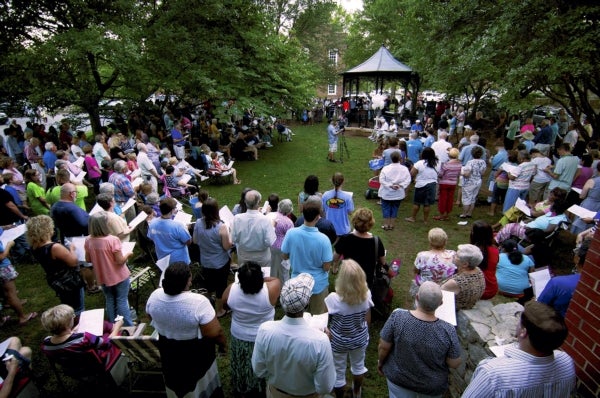Elizabeth Cook: Mother Emanuel’s lasting impact
Published 12:00 am Sunday, June 28, 2015

- A larger-than-expected crowd turned out for the prayer vigil at Salisbury's Bell Tower, held in June 2015 in memory of the church members killed by a gunman in Charleston. Jon C. Lakey/Salisbury Post
Sanctuary. Refuge. Home. People use warm words when they talk about their churches.
Terror. Massacre. Bloodshed. We don’t associate these words with church — or didn’t, until the attack at Emanuel AME Church in Charleston, S.C.
Now some 10 days after nine people were slain at the historic “Mother Emanuel,” other stories threaten to push the tragedy to the back of our minds — debate over the Confederate flag, Supreme Court rulings on the Affordable Care Act and same-sex marriage, the shooting of one escaped N.Y. convict and search for another.
Make no mistake, though. We are a long way from dealing with the taking of those nine precious lives in Charleston. The victims’ families may have already forgiven suspect Dylann Roof, but justice moves slowly. And then there’s this: The horrific attack has cracked open the door of bigotry, giving all a glimpse of the hatred and prejudice normally hidden from polite society — ingrained attitudes that continue to shape our society even as we deny their existence.
Some 300 people gathered at the foot of Salisbury’s historic Bell Tower last Sunday evening to pray for peace. A bell tolled for the victims, one by one.
Tuesday evening hundreds more sent up prayers in local services at Cornerstone Church and Gethsemane Missionary Baptist Church in scenes repeated across the country more times than we’ll ever know. Millions of prayers have gone up since gunfire pierced the peace of Mother Emanuel’s simple Bible study.
With those prayers still in the air, S.C. Gov. Nikki Haley called for the removal of the Confederate flag from the Capitol grounds in Columbia, and sentiment on that stubborn issue flipped with amazing speed.
Just days after defending the flag as part of the South’s history, presidential hopeful U.S. Sen. Lindsey Graham fell in line with Haley. “I hope that, by removing the flag, we can take another step towards healing and recognition – and a sign that South Carolina is moving forward,” Graham said.
As blacks and whites have said, though, that flag didn’t kill the people at Emanuel AME Church. Now that this symbolic step appears imminent, it’s time to ask, what’s next?
President Obama shocked everyone by singing “Amazing Grace” at state Sen. Clementa Pinckney’s funeral Friday.
“… was blind but now I see.”
So much of what drives our society is invisible, including racial bias.
“Perhaps we see that now,” Obama said. “Perhaps this tragedy causes us to ask some tough questions about how we can permit so many of our children to languish in poverty …
“… or attend dilapidated schools or grow up without prospects for a job or for a career.
“Perhaps it causes us to examine what we’re doing to cause some of our children to hate.
“Perhaps it softens hearts towards those lost young men, tens and tens of thousands caught up in the criminal-justice system and lead us to make sure that that system’s not infected with bias.”
The state can shortchange children without sending them to outwardly dilapidated schools. Why is it that, as the student population becomes poorer and more racially diverse, support for public education declines? Legislators and county commissioners bemoan what big chunks of their budgets go toward public education as if it’s a burden instead of an opportunity to improve lives.
Decades from now when we look back at the early 21st century, when time and distance give better perspective, what will we make of the gap between the test scores of white children and black children? How will we explain the poverty that so often falls along color lines and holds families down generation after generation?
The loss of life in Charleston should be a turning point, a wake-up call to those who think we’ve done everything necessary to defeat racism and ensure equal opportunity.
The families of the Charleston Nine have led the way. Instead of revenge, they call for redemption. This moment cannot be whisked away by the rush of other events. The spotlight of the 24/7 news cycle will turn elsewhere — we live in a time of unprecedented change. But prejudice persists.
The nation has much unfinished business when it comes to racial attitudes, and for that Mother Emanuel has become ground zero.
Elizabeth Cook is editor of the Salisbury Post.

